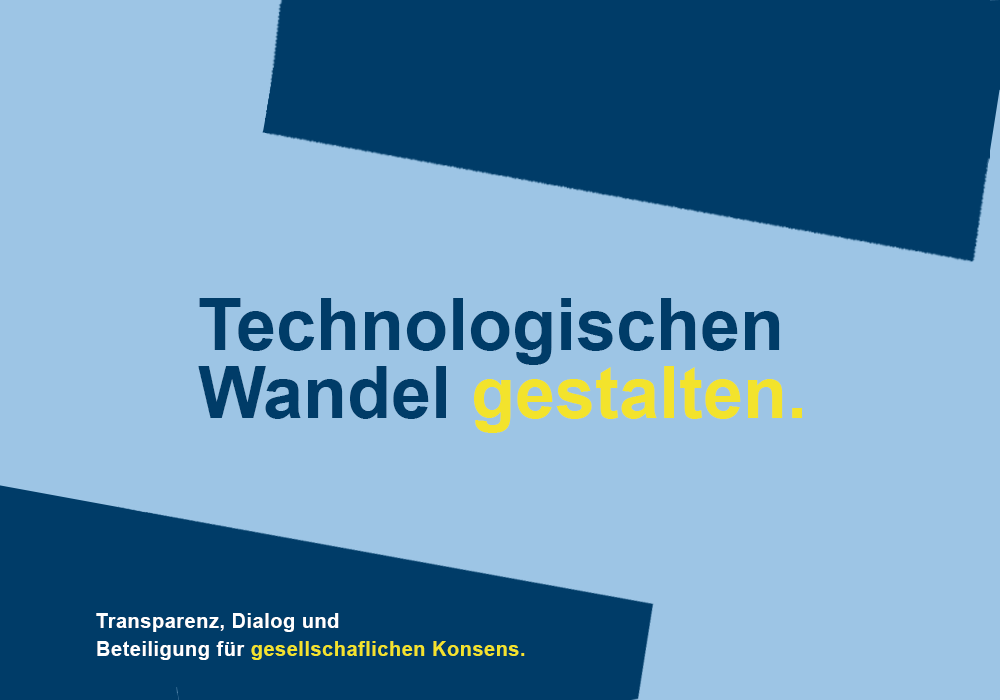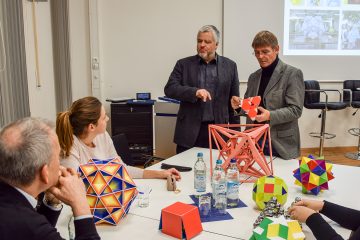acatech study shows how opinion-forming on technology topics can work

Munich, 18 March 2024
The benefits of new technologies will only be realised if they are at least tolerated by people, but preferably accepted by society as a whole. This requires dialogue and opportunities for joint design. The acatech project “Shaping technological change” has investigated which communication formats are suitable for this and what effect they have on those involved in the topics of electronic patient records, digital administration and disaster control. The project team has now presented its findings.
With the publication “Unterstützung von Meinungsbildung im digitalen Wandel” (Supporting Opinion Formation in the Digital Transformation), acatech presents a comprehensive study on how an effective dialogue with the public on controversial technology topics can be implemented. The study summarises the findings of two sub-studies from the “Shaping technological change” project.
On the one hand, studies in two municipalities focussed on the question of the extent to which focus groups – a research method that relies on moderated and focused discussions in small groups – can contribute to the formation of participants’ opinions. While the focus group in the small town of Wittenberge in Brandenburg discussed the possibilities of digital administration, the discussions in Wuppertal, which is regularly threatened by flooding due to its valley location on the River Wupper, focussed on disaster prevention.
The other sub-study aimed to answer the question of whether a playful website can be a suitable tool for forming opinions on a complex digital innovation such as the electronic patient record (ePA). The ePA is to be created automatically for every citizen from 2025 – unless they actively object. The “ePA check-up” (in German) developed by the project team guided visitors to the website through various topics, using illustrative examples, expert opinions and quiz elements to show how the ePA works, but also what risks are associated with it. At the end, users received an evaluation of their current position.
“We keep hearing that we need to ‘take the public with us’ when it comes to technological change,” says acatech President and Co-Project Manager Jan Wörner. “This is a misleading image: it sounds as if people are sitting in the back seat of the car and don’t know the destination of the journey. It is much more accurate to speak of car pools to emphasise the active role of citizens in shaping technological change. That was the approach of the project: we wanted to develop and test communication formats in which the participants feel taken seriously and can form an opinion based on balanced facts.”
Impact analysis: advantages and disadvantages of the tested communication formats
The study arrives at different assessments of the sub-studies: On the one hand, the focus groups were only able to reach a small number of people – however, a clear effect on opinion formation was observed among these few people: Some participants spoke of real broadening of perspectives, previously existing attitudes changed.
On the other hand, almost 3,000 users went through the ePA check-up. However, according to the results of the analysis, it seems rather unlikely that changes in opinion or even behaviour will occur as a result. Instead, participation in the ePA Check-up tended to reinforce existing preconceptions on the topic. However, the visit also helped around 17 per cent of the test subjects to form an initial opinion.
“With our technology communication formats, we often only reach people who already have a keen interest in technology and are open to innovation. However, our empirical research results have shown that focus groups in which we specifically address people from non-technical or technology-sceptical circles can overcome this shortcoming and provide valuable information for technology design and communication. It is equally important that we provide information in technology communication that is understandable, entertaining and comprehensible. We succeeded in doing this with the ePA Check-up. However, this offer was mainly used by people who already had an interest in the topic and a positive basic attitude,” explains acatech Executive Committee member and co-project manager Ortwin Renn.
The publication “Supporting Opinion Formation in the Digital Transformation” not only provides new findings on the impact of communication formats, but also on their content design. According to the report, an “appropriate balance” was the benchmark when designing the focus group studies and the ePA check-up. “Balance does not mean giving equal space to pros and cons across the board, but rather creating fair spaces for discourse in which arguments can be exchanged in all directions.”



